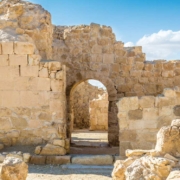One of the major obstacles to Jews believing in Yeshua is their belief that the religion of Judaism is incompatible with the Messianic faith. And, in fact, it is… just not for the reasons they think. Among religious Jews, some have asserted that the incompatibility lies partly in believers’ rejection of the Oral Law—that this rejection is evidence of Yeshua-followers’ misunderstanding of the Scriptures, and that if not for such misunderstanding, they would reject Yeshua instead. The truth of this allegation therefore hinges upon one simple question: does the Oral Law carry the authority that Judaism asserts it has? Put another way, in order to determine whether or not the Oral Law should be accepted and adhered to, we first need to determine if it actually comes from God—if the Oral Law is actually biblical.
Read more
When we don’t understand the reason for the troubles we’re facing, there is great comfort in the story of Joseph. For many of us, his unwavering devotion to God through unjust persecution is a source of inspiration, and our trust in God is renewed by seeing the good He brought out of Joseph’s suffering. Even more, Joseph is ingrained in the history and identity of Israel for his role in saving his family so they could become the great nation God had promised they would be. But what if there is still more to glean from Joseph? As a savior of Israel, could he serve as a pattern and parallel of the Messiah Yeshua Himself? Let’s take a moment to recount Joseph’s story, and afterwards, we’ll compare it to Yeshua’s life. The patterns we discover will help us draw out a truth which both stories share: that God can work despite and even through Israel’s hatred of their God-given savior, and will eventually reconcile them to their deliverer.
Read more
The people of Israel stood before Adonai’s appointed judge, the prophet Samuel. Four hundred years had passed since Israel left Egypt, and throughout that time Adonai had faithfully led His people. With the giving of His Torah through Moses, the God of Israel had become their King (Deu. 33:2-5), and by the hands of His judges, He had delivered them from all their enemies. But now they assembled before Samuel and announced their arrogant request: “Give us a king to judge us,” they cried, “that we also may be like all the nations” (1Sa. 8:6&20, esv).
Read more
The idea that God can have a son is not only biblical, but was well-understood by the ancients. As we explored earlier, the concept is found most clearly in the kingship of David and the expectation for the sonship of his endless line upon Israel’s throne. But someone being called God’s son is not quite the same as someone being the Son of God. Yeshua, then, needed to further narrow the definition of God’s “son.” He would not only be Israel’s messianic, priestly king, but also the means of blessing all the families of the earth through His sacrifice, atonement, and offer of salvation and eternal life. Yeshua had to be something more than those who came before… something that many of the people of Israel weren’t yet ready to receive. Read more
As we previously learned from the Hebrew Scriptures, there is nothing bizarre or outrageous about God having a son. It does not imply or necessitate any kind of natural childbirth or other-worldly conception, but instead speaks to the characteristics of a special relationship with God. Israel’s sonship, for example, is defined by being called God’s firstborn and heir of His promises and purposes—God’s instrument for blessing all the nations. God also declared both David and David’s heir to be His son, as He brought forth a line of kings that He promised would reign in Israel forever. Israel and David, then, are God’s sons in the sense that He is the progenitor of a people through whom He would disseminate and propagate His message and glory to the world.
Read more
The “New Testament” claims that Yeshua is the Son of God—an inconceivable and offensive claim in the eyes of Judaism. How could the holy, eternal Creator of the universe have a human son? Did He defile Himself to procreate with humans? Did He father biological offspring as in Greek myths and pagan religions? Yet despite such cynical ad hominems and red herrings—and regardless of whether one is prepared to believe that Yeshua is indeed that very Son—the concept of God having a son is actually not so unbelievable. It is, in fact, deeply rooted in the history of Israel and in the Hebrew Scriptures. Read more
“Adonai your God will raise up to you a prophet like me from among you, from your brothers. You must listen to him….” (Deuteronomy 18:15, mjlt)
Reaching the end of his days, Moses stood before Israel, giving them his final instructions before he could lead them no more. Prophet that he was, Moses pointed to the future, urging his people to await the coming of one who would take his place. Read more
“And having been made perfect, He became a cause of age-enduring salvation to all those obeying Him, having been addressed by God as a Kohen Gadol according to the order of Mal’kiy-Tzedeq.” (He. 5:9-10, mjlt)
The book of Hebrews speaks of a mystery central to our faith: How did the great High Priest, Yeshua, arise from outside the priestly tribe of Levi, and why? Though the question may seem obscure to us now, thousands of years after the line of priests was broken, the answer is still as important as ever. Grasping it not only illuminates the magnificence of the Master’s sacrifice, but also illustrates how the Father continually maintains His covenants—sometimes in unexpected ways.
“Indeed, if you were believing Mosheh, you would have been believing me, for he wrote about me. But if you do not believe his writings, how will you believe my sayings?”
John 5:46-47, mjlt
The Jews sought to kill their own Messiah. Though the crowd was motivated by Yeshua’s supposed violation of the Shabbat, their rage was not truly founded on a love of God or His words. On the contrary, it was fueled by their disbelief of what God had spoken in the very Scriptures they appeared to defend—the Torah. Moses wrote about Yeshua many times, prophesying with symbolism, allusions, and even with plain speech. By looking at just a few examples, we can see how Moses illuminates some of the most important aspects of Yeshua’s life and work as our Messiah.
Hundreds of times in the New Covenant Scriptures, Yeshua is called “the Messiah.” Yet all too often, we fail to recognize the magnitude of this defining title. We know who the Messiah is, but do we truly comprehend what it means for Him to be the Messiah? Obviously, this title is significant, but in what way? Throughout the Hebrew Scriptures, we find other people who are also called “messiahs,” and examining their distinctions can help clarify the meaning and importance of Yeshua’s Messianic role.
Read morea Perfect Word Ministry












